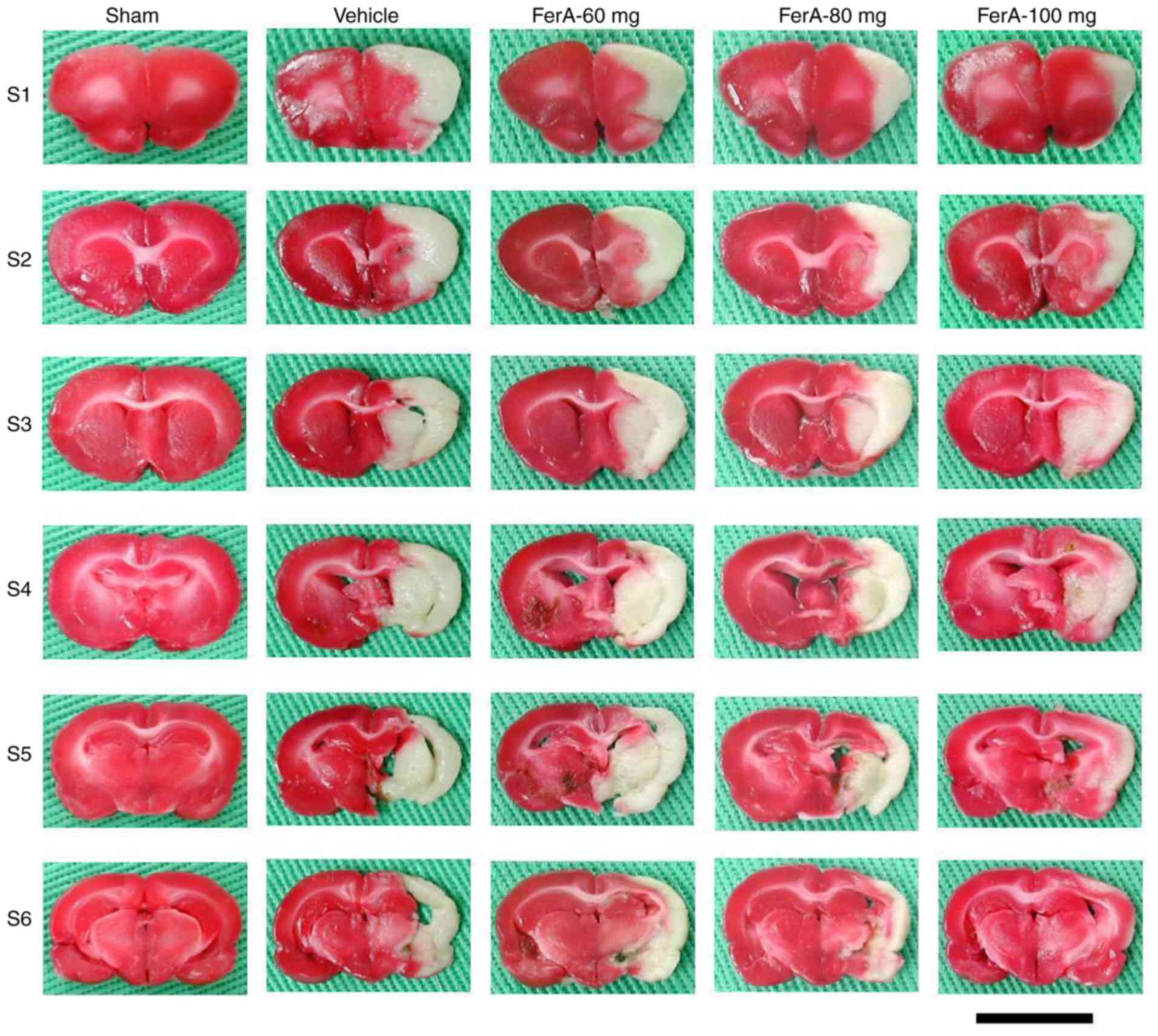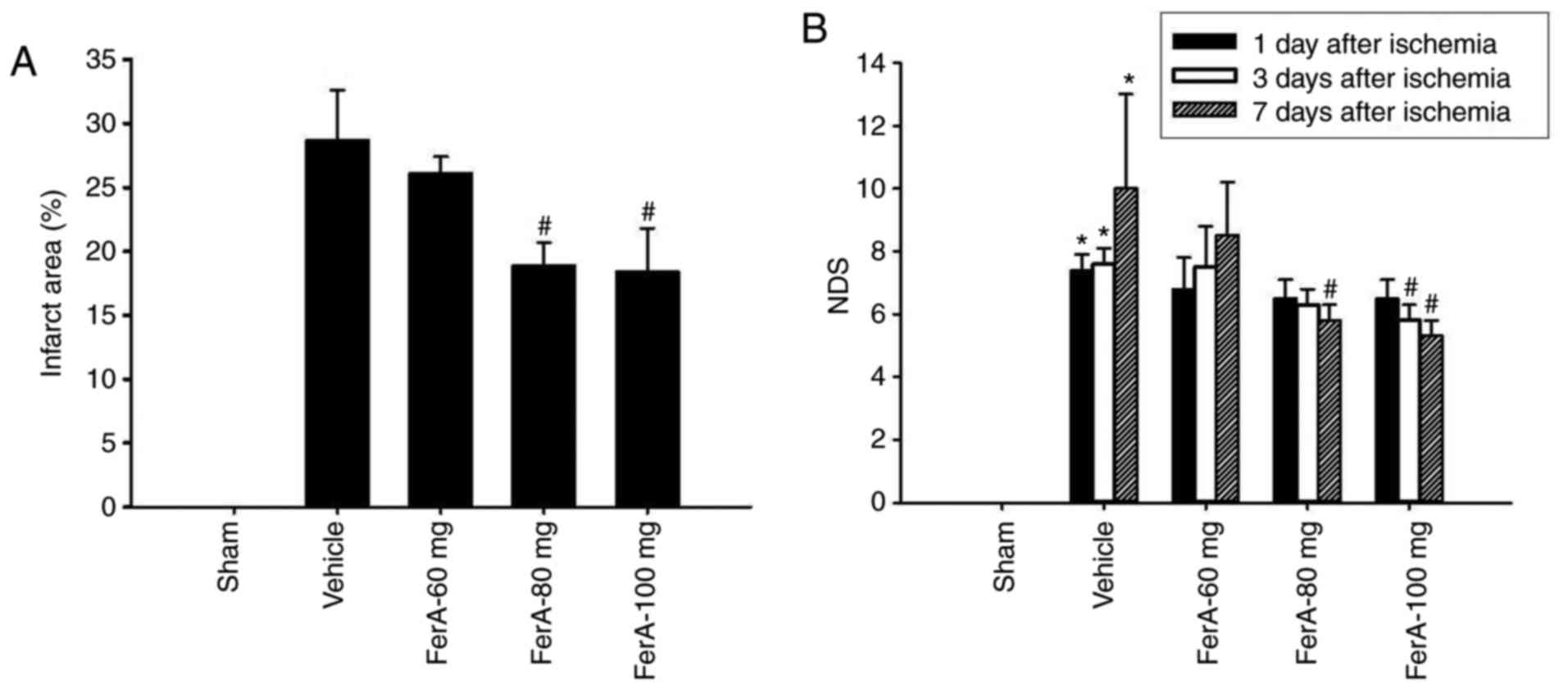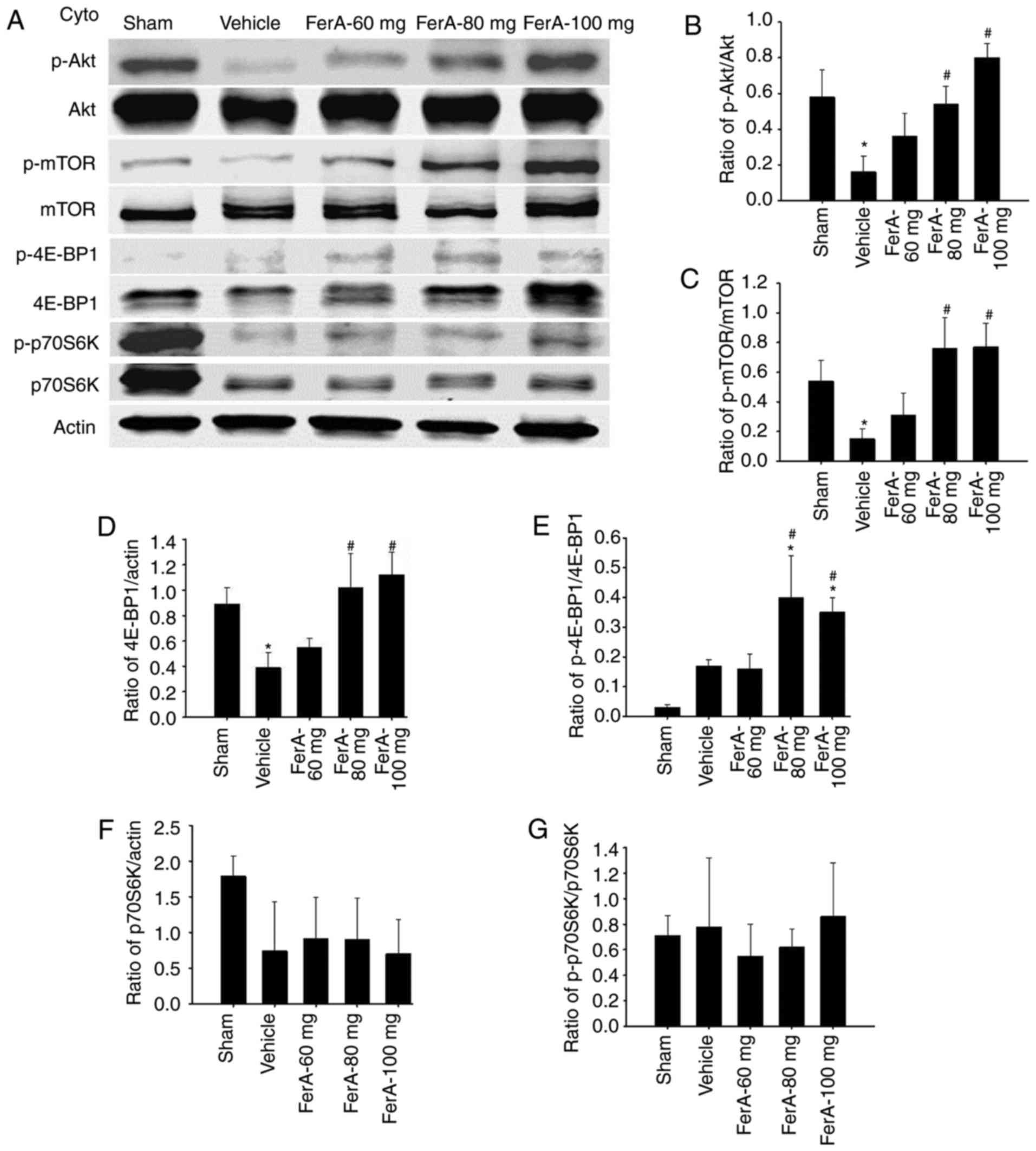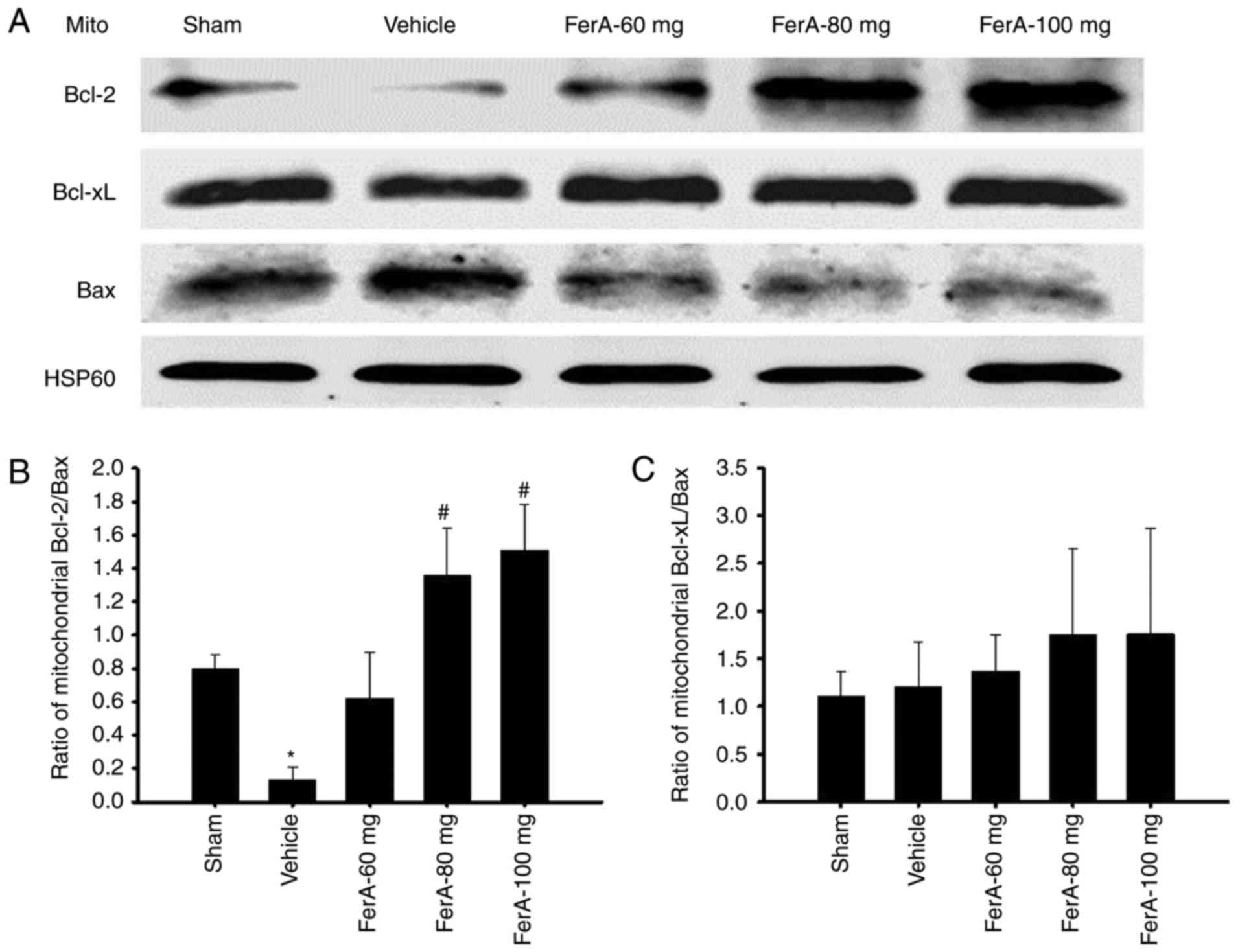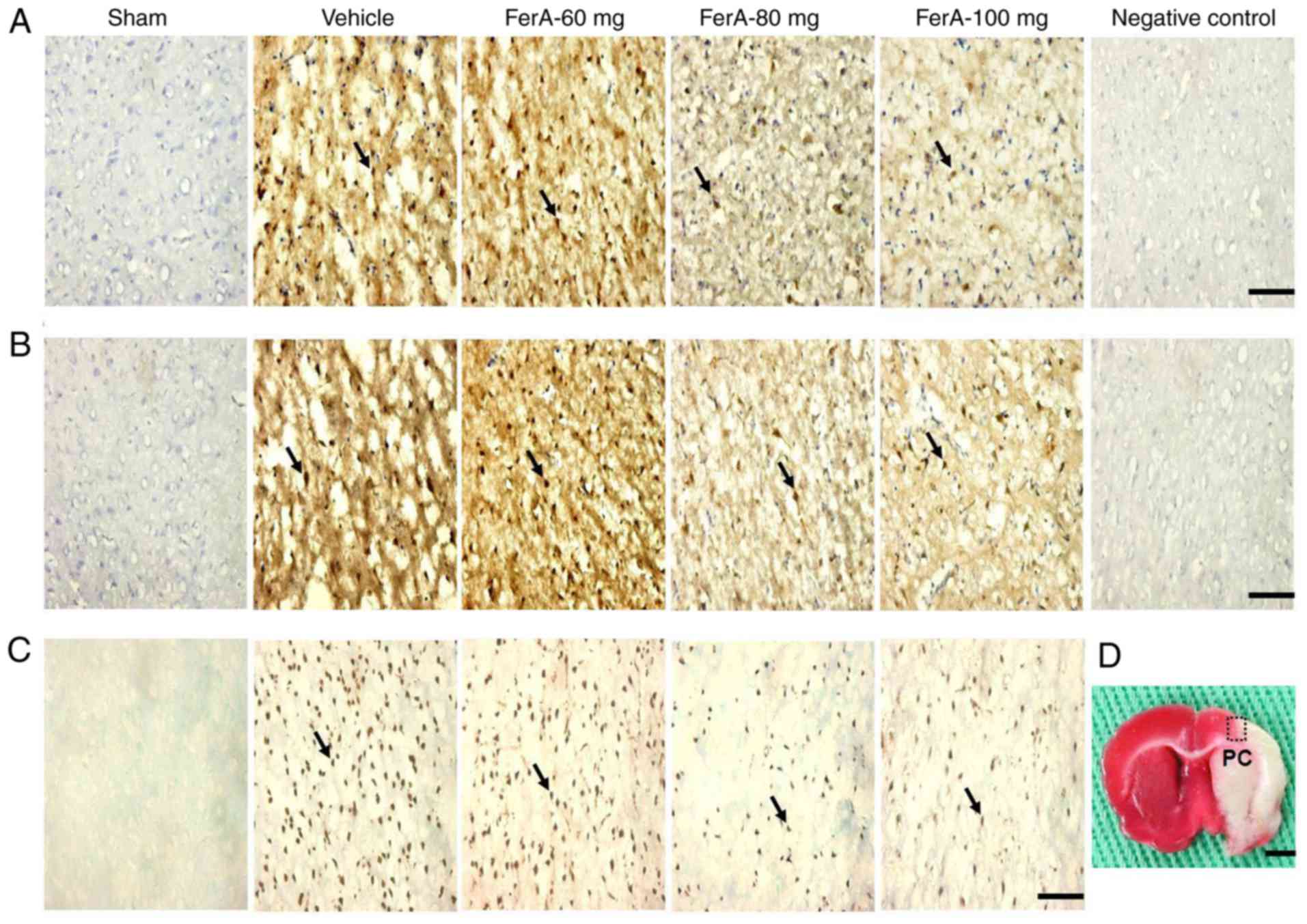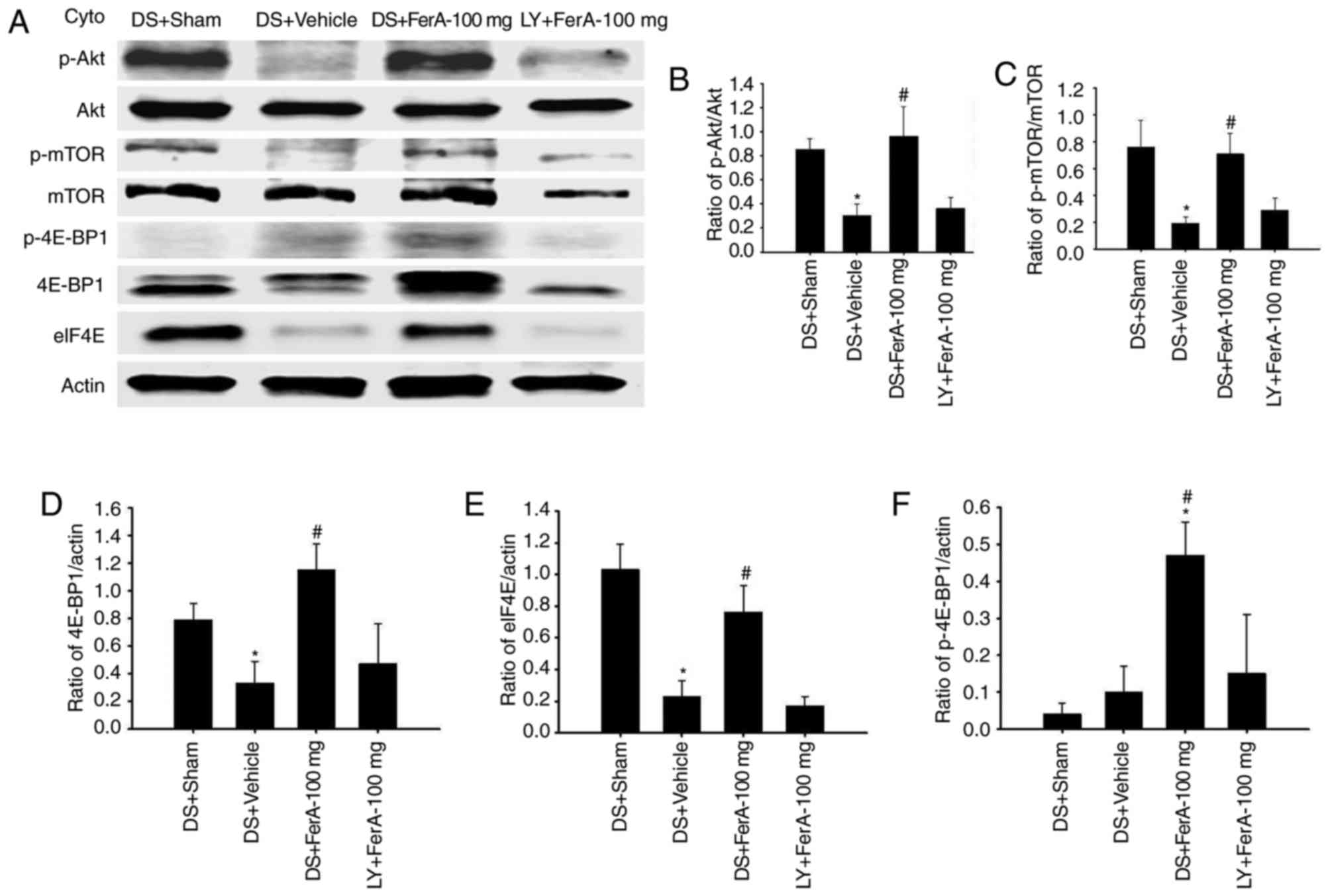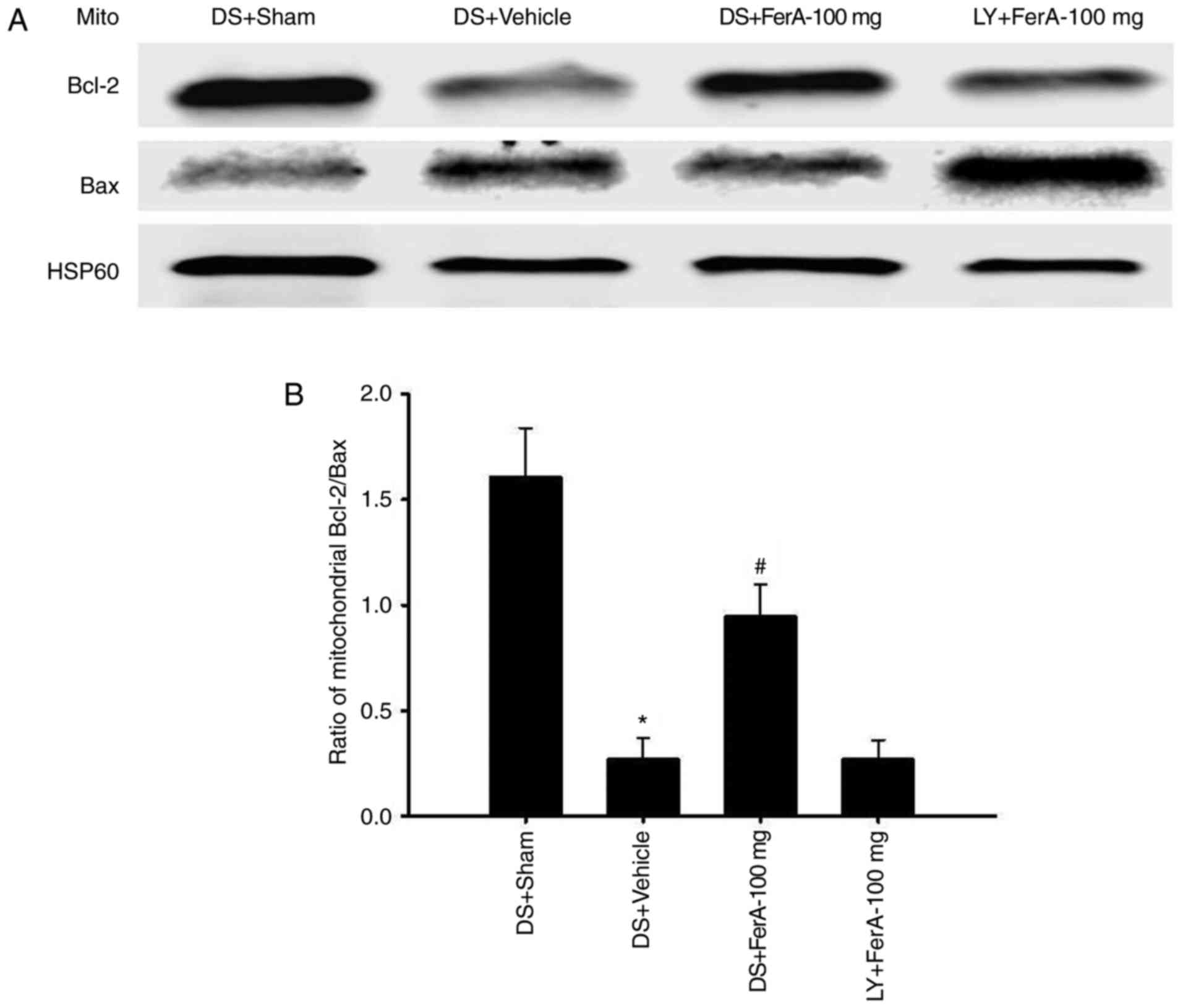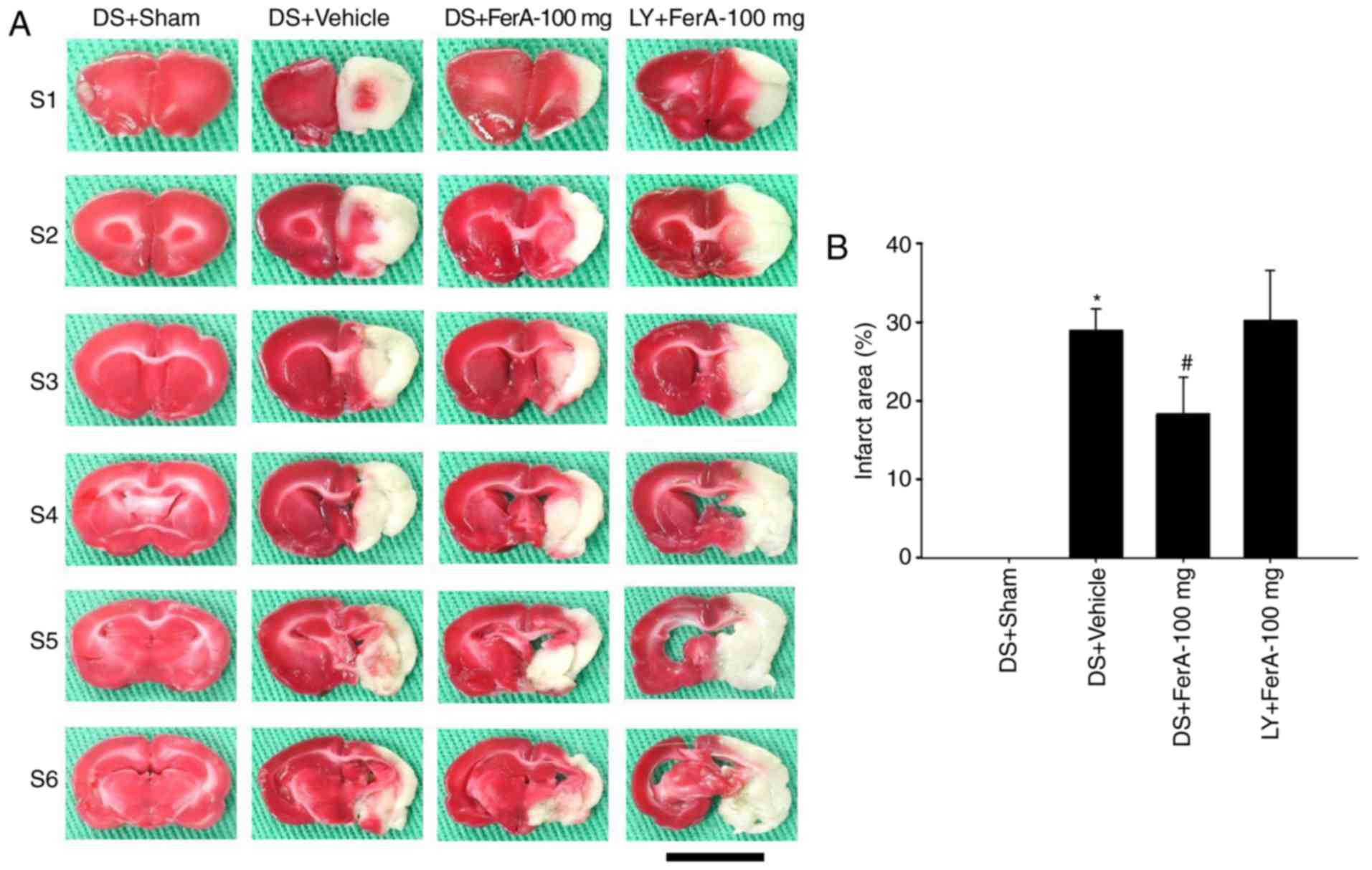|
1
|
Cheng CY, Tang NY, Kao ST and Hsieh CL:
Ferulic acid administered at various time points protects against
cerebral infarction by activating p38 MAPK/p90RSK/CREB/Bcl-2
anti-apoptotic signaling in the subacute phase of cerebral
ischemia-reperfusion injury in rats. PLoS One. 11:e01557482016.
View Article : Google Scholar : PubMed/NCBI
|
|
2
|
Huang H, Zhong R, Xia Z, Song J and Feng
L: Neuroprotective effects of rhynchophylline against ischemic
brain injury via regulation of the Akt/mTOR and TLRs signaling
pathways. Molecules. 19:11196–11210. 2014. View Article : Google Scholar : PubMed/NCBI
|
|
3
|
Wang M, Li YJ, Ding Y, Zhang HN, Sun T,
Zhang K, Yang L, Guo YY, Liu SB, Zhao MG and Wu YM: Silibinin
prevents autophagic cell death upon oxidative stress in cortical
neurons and cerebral ischemia-reperfusion injury. Mol Neurobiol.
53:932–943. 2016. View Article : Google Scholar : PubMed/NCBI
|
|
4
|
Zhu H, Zhang Y, Shi Z, Lu D, Li T, Ding Y,
Ruan Y and Xu A: The neuroprotection of liraglutide against
ischaemia-induced apoptosis through the activation of the PI3K/AKT
and MAPK pathways. Sci Rep. 6:268592016. View Article : Google Scholar : PubMed/NCBI
|
|
5
|
Koh PO: Melatonin prevents ischemic brain
injury through activation of the mTOR/p70S6 kinase signaling
pathway. Neurosci Lett. 444:74–78. 2008. View Article : Google Scholar : PubMed/NCBI
|
|
6
|
Xie R, Cheng M, Li M, Xiong X, Daadi M,
Sapolsky RM and Zhao H: Akt isoforms differentially protect against
stroke-induced neuronal injury by regulating mTOR activities. J
Cereb Blood Flow Metab. 33:1875–1885. 2013. View Article : Google Scholar : PubMed/NCBI
|
|
7
|
Maiese K, Chong ZZ, Wang S and Shang YC:
Oxidant stress and signal transduction in the nervous system with
the PI 3-K, Akt, and mTOR cascade. Int J Mol Sci. 13:13830–13866.
2012. View Article : Google Scholar : PubMed/NCBI
|
|
8
|
Wang C, Wang Z, Zhang X, Dong L, Xing Y,
Li Y, Liu Z, Chen L, Qiao H, Wang L and Zhu C: Protection by
silibinin against experimental ischemic stroke: Up-regulated pAkt,
pmTOR, HIF-1alpha and Bcl-2, down-regulated Bax, NF-kappaB
expression. Neurosci Lett. 529:45–50. 2012. View Article : Google Scholar : PubMed/NCBI
|
|
9
|
Wu C, Fujihara H, Yao J, Qi S, Li H,
Shimoji K and Baba H: Different expression patterns of Bcl-2,
Bcl-xl, and Bax proteins after sublethal forebrain ischemia in
C57Black/Crj6 mouse striatum. Stroke. 34:1803–1808. 2003.
View Article : Google Scholar : PubMed/NCBI
|
|
10
|
Chi OZ, Barsoum S, Vega-Cotto NM, Barsoum
S, Vega-Cotto NM, Jacinto E, Liu X, Mellender SJ and Weiss HR:
Effects of rapamycin on cerebral oxygen supply and consumption
during reperfusion after cerebral ischemia. Neuroscience.
316:321–327. 2016. View Article : Google Scholar : PubMed/NCBI
|
|
11
|
Xie R, Wang P, Cheng M, Sapolsky R, Ji X
and Zhao H: Mammalian target of rapamycin cell signaling pathway
contributes to the protective effects of ischemic postconditioning
against stroke. Stroke. 45:2769–2776. 2014. View Article : Google Scholar : PubMed/NCBI
|
|
12
|
Koh PO: Gingko biloba extract (EGb 761)
prevents cerebral ischemia-induced p70S6 kinase and S6
phosphorylation. Am J Chin Med. 38:727–734. 2010. View Article : Google Scholar : PubMed/NCBI
|
|
13
|
Koh PO, Cho JH, Won CK, Lee HJ, Sung JH
and Kim MO: Estradiol attenuates the focal cerebral ischemic injury
through mTOR/p70S6 kinase signaling pathway. Neurosci Lett.
436:62–66. 2008. View Article : Google Scholar : PubMed/NCBI
|
|
14
|
Chong ZZ, Yao Q and Li HH: The rationale
of targeting mammalian target of rapamycin for ischemic stroke.
Cell Signal. 25:1598–1607. 2013. View Article : Google Scholar : PubMed/NCBI
|
|
15
|
Ayuso MI, Hernández-Jiménez M, Martin ME,
Salinas M and Alcázar A: New hierarchical phosphorylation pathway
of the translational repressor eIF4E-binding protein 1 (4E-BP1) in
ischemia-reperfusion stress. J Biol Chem. 285:34355–34363. 2010.
View Article : Google Scholar : PubMed/NCBI
|
|
16
|
Ayuso MI, Martinez-Alonso E, Cid C, Alonso
de Leciñana M and Alcázar A: The translational repressor
eIF4E-binding protein 2 (4E-BP2) correlates with selective delayed
neuronal death after ischemia. J Cereb Blood Flow Metab.
33:1173–1181. 2013. View Article : Google Scholar : PubMed/NCBI
|
|
17
|
Xie R, Wang P, Ji X and Zhao H: Ischemic
post-conditioning facilitates brain recovery after stroke by
promoting Akt/mTOR activity in nude rats. J Neurochem. 127:723–732.
2013. View Article : Google Scholar : PubMed/NCBI
|
|
18
|
Koh PO: Ferulic acid modulates nitric
oxide synthase expression in focal cerebral ischemia. Lab Anim Res.
28:273–278. 2012. View Article : Google Scholar : PubMed/NCBI
|
|
19
|
Zhang L, Wang H, Wang T, Jiang N, Yu P,
Chong Y and Fu F: Ferulic acid ameliorates nerve injury induced by
cerebral ischemia in rats. Exp Ther Med. 9:972–976. 2015.
View Article : Google Scholar : PubMed/NCBI
|
|
20
|
Wu YC and Hsieh CL: Pharmacological
effects of radix angelica sinensis (Danggui) on cerebral
infarction. Chin Med. 6:322011. View Article : Google Scholar : PubMed/NCBI
|
|
21
|
Cheng CY, Ho TY, Lee EJ, Su SY, Tang NY
and Hsieh CL: Ferulic acid reduces cerebral infarct through its
antioxidative and anti-inflammatory effects following transient
focal cerebral ischemia in rats. Am J Chin Med. 36:1105–1119. 2008.
View Article : Google Scholar : PubMed/NCBI
|
|
22
|
Cheng CY, Su SY, Tang NY, Ho TY, Chiang SY
and Hsieh CL: Ferulic acid provides neuroprotection against
oxidative stress-related apoptosis after cerebral
ischemia/reperfusion injury by inhibiting ICAM-1 mRNA expression in
rats. Brain Res. 1209:136–150. 2008. View Article : Google Scholar : PubMed/NCBI
|
|
23
|
Koh PO: Ferulic acid prevents the cerebral
ischemic injury-induced decrease of Akt and Bad phosphorylation.
Neurosci Lett. 507:156–160. 2012. View Article : Google Scholar : PubMed/NCBI
|
|
24
|
Koh PO: Ferulic acid prevents the cerebral
ischemic injury-induced decreases of astrocytic phosphoprotein
PEA-15 and its two phosphorylated forms. Neurosci Lett.
511:101–105. 2012. View Article : Google Scholar : PubMed/NCBI
|
|
25
|
Longa EZ, Weinstein PR, Carlson S and
Cummins R: Reversible middle cerebral artery occlusion without
craniectomy in rats. Stroke. 20:84–91. 1989. View Article : Google Scholar : PubMed/NCBI
|
|
26
|
Chen J, Sanberg PR, Li Y, Wang L, Lu M,
Willing AE, Sanchez-Ramos J and Chopp M: Intravenous administration
of human umbilical cord blood reduces behavioral deficits after
stroke in rats. Stroke. 32:2682–2688. 2001. View Article : Google Scholar : PubMed/NCBI
|
|
27
|
Hsiang CY, Wu SL and Ho TY: Morin inhibits
12-O-tetradecanoylphorbol-13-acetate-induced hepatocellular
transformation via activator protein 1 signaling pathway and cell
cycle progression. Biochem Pharmacol. 69:1603–1611. 2005.
View Article : Google Scholar : PubMed/NCBI
|
|
28
|
Cheng CY, Lin JG, Tang NY, Kao ST and
Hsieh CL: Electroacupuncture-like stimulation at the Baihui (GV20)
and Dazhui (GV14) acupoints protects rats against subacute-phase
cerebral ischemia-reperfusion injuries by reducing S100B-mediated
neurotoxicity. PLoS One. 9:e914262014. View Article : Google Scholar : PubMed/NCBI
|
|
29
|
Cheng CY, Lin JG, Su SY, Tang NY, Kao ST
and Hsieh CL: Electroacupuncture-like stimulation at Baihui and
Dazhui acupoints exerts neuroprotective effects through activation
of the brain-derived neurotrophic factor-mediated
MEK1/2/ERK1/2/p90RSK/bad signaling pathway in mild transient focal
cerebral ischemia in rats. BMC Complement Altern Med. 14:922014.
View Article : Google Scholar : PubMed/NCBI
|
|
30
|
Matsui T, Mori T, Tateishi N, Kagamiishi
Y, Satoh S, Katsub N, Morikawa E, Morimoto T, Ikuta F and Asano T:
Astrocytic activation and delayed infarct expansion after permanent
focal ischemia in rats. Part I: Enhanced astrocytic synthesis of
s-100beta in the periinfarct area precedes delayed infarct
expansion. J Cereb Blood Flow Metab. 22:711–722. 2002. View Article : Google Scholar : PubMed/NCBI
|
|
31
|
Mori T, Town T, Kobayashi M, Tan J, Fujita
SC and Asano T: Augmented delayed infarct expansion and reactive
astrocytosis after permanent focal ischemia in apolipoprotein E4
knock-in mice. J Cereb Blood Flow Metab. 24:646–656. 2004.
View Article : Google Scholar : PubMed/NCBI
|
|
32
|
Koh PO: Ferulic acid attenuates the
injury-induced decrease of protein phosphatase 2A subunit B in
ischemic brain injury. PLoS One. 8:e542172013. View Article : Google Scholar : PubMed/NCBI
|
|
33
|
Tateishi N, Mori T, Kagamiishi Y, Satoh S,
Katsube N, Morikawa E, Morimoto T, Matsui T and Asano T: Astrocytic
activation and delayed infarct expansion after permanent focal
ischemia in rats. Part II: Suppression of astrocytic activation by
a novel agent (R)-(−)-2-propyloctanoic acid (ONO-2506) leads to
mitigation of delayed infarct expansion and early improvement of
neurologic deficits. J Cereb Blood Flow Metab. 22:723–734. 2002.
View Article : Google Scholar : PubMed/NCBI
|
|
34
|
Tang Q, Han R, Xiao H, Shen J, Luo Q and
Li J: Neuroprotective effects of tanshinone IIA and/or
tetramethylpyrazine in cerebral ischemic injury in vivo and in
vitro. Brain Res. 1488:81–91. 2012. View Article : Google Scholar : PubMed/NCBI
|
|
35
|
Shi J, Gu JH, Dai CL, Gu J, Jin X, Sun J,
Iqbal K, Liu F and Gong CX: O-GlcNAcylation regulates
ischemia-induced neuronal apoptosis through AKT signaling. Sci Rep.
5:145002015. View Article : Google Scholar : PubMed/NCBI
|
|
36
|
Wu J, Li J, Hu H, Liu P, Fang Y and Wu D:
Rho-kinase inhibitor, fasudil, prevents neuronal apoptosis via the
Akt activation and PTEN inactivation in the ischemic penumbra of
rat brain. Cell Mol Neurobiol. 32:1187–1197. 2012. View Article : Google Scholar : PubMed/NCBI
|
|
37
|
Ishrat T, Sayeed I, Atif F, Hua F and
Stein DG: Progesterone is neuroprotective against ischemic brain
injury through its effects on the phosphoinositide 3-kinase/protein
kinase B signaling pathway. Neuroscience. 210:442–450. 2012.
View Article : Google Scholar : PubMed/NCBI
|
|
38
|
Bracho-Valdés I, Moreno-Alvarez P,
Valencia-Martinez I, Robles-Molina E, Chavez-Vargas L and
Vázquez-Prado J: mTORC1- and mTORC2-interacting proteins keep their
multifunctional partners focused. IUBMB Life. 63:896–914. 2011.
View Article : Google Scholar : PubMed/NCBI
|
|
39
|
Li W, Yang Y, Hu Z, Ling S and Fang M:
Neuroprotective effects of DAHP and Triptolide in focal cerebral
ischemia via apoptosis inhibition and PI3K/Akt/mTOR pathway
activation. Front Neuroanat. 9:482015. View Article : Google Scholar : PubMed/NCBI
|
|
40
|
Josse L, Xie J, Proud CG and Smales CM:
mTORC1 signalling and eIF4E/4E-BP1 translation initiation factor
stoichiometry influence recombinant protein productivity from
GS-CHOK1 cells. Biochem J. 473:4651–4664. 2016. View Article : Google Scholar : PubMed/NCBI
|
|
41
|
Hay N and Sonenberg N: Upstream and
downstream of mTOR. Genes Dev. 18:1926–1945. 2004. View Article : Google Scholar : PubMed/NCBI
|
|
42
|
Koh PO: Ferulic acid attenuates focal
cerebral ischemia-induced decreases in p70S6 kinase and S6
phosphorylation. Neurosci Lett. 555:7–11. 2013. View Article : Google Scholar : PubMed/NCBI
|
|
43
|
Attar-Schneider O, Pasmanik-Chor M,
Tartakover-Matalon S, Drucker L and Lishner M: eIF4E and eIF4GI
have distinct and differential imprints on multiple myeloma's
proteome and signaling. Oncotarget. 6:4315–4329. 2015. View Article : Google Scholar : PubMed/NCBI
|
|
44
|
Li S, Perlman DM, Peterson MS, Burrichter
D, Avdulov S, Polunovsky VA and Bitterman PB: Translation
initiation factor 4E blocks endoplasmic reticulum-mediated
apoptosis. J Biol Chem. 279:21312–21317. 2004. View Article : Google Scholar : PubMed/NCBI
|
|
45
|
Fan S, Li Y, Yue P, Khuri FR and Sun SY:
The eIF4E/eIF4G interaction inhibitor 4EGI-1 augments
TRAIL-mediated apoptosis through c-FLIP Down-regulation and DR5
induction independent of inhibition of cap-dependent protein
translation. Neoplasia. 12:346–356. 2010. View Article : Google Scholar : PubMed/NCBI
|
|
46
|
Cao G, Minami M, Pei W, Yan C, Chen D,
O'Horo C, Graham SH and Chen J: Intracellular Bax translocation
after transient cerebral ischemia: Implications for a role of the
mitochondrial apoptotic signaling pathway in ischemic neuronal
death. J Cereb Blood Flow Metab. 21:321–333. 2001. View Article : Google Scholar : PubMed/NCBI
|
|
47
|
Noshita N, Sugawara T, Fujimura M,
Morita-Fujimura Y and Chan PH: Manganese superoxide dismutase
affects cytochrome c release and caspase-9 activation after
transient focal cerebral ischemia in mice. J Cereb Blood Flow
Metab. 21:557–567. 2001. View Article : Google Scholar : PubMed/NCBI
|
|
48
|
Li L, Peng L and Zuo Z: Isoflurane
preconditioning increases B-cell lymphoma-2 expression and reduces
cytochrome c release from the mitochondria in the ischemic
penumbra of rat brain. Eur J Pharmacol. 586:106–113. 2008.
View Article : Google Scholar : PubMed/NCBI
|
|
49
|
Liu D, Lu C, Wan R, Auyeung WW and Mattson
MP: Activation of mitochondrial ATP-dependent potassium channels
protects neurons against ischemia-induced death by a mechanism
involving suppression of Bax translocation and cytochrome c
release. J Cereb Blood Flow Metab. 22:431–443. 2002. View Article : Google Scholar : PubMed/NCBI
|
|
50
|
Lee HK, Jang JY, Yoo HS and Seong YH:
Neuroprotective effect of phytoceramide against transient focal
ischemia-induced brain damage in rats. Arch Pharm Res.
38:2241–2350. 2015. View Article : Google Scholar : PubMed/NCBI
|
|
51
|
Zheng L, Ding J, Wang J, Zhou C and Zhang
W: Effects and mechanism of action of inducible nitric oxide
synthase on apoptosis in a rat model of cerebral
ischemia-reperfusion injury. Anat Rec. 299:246–255. 2016.
View Article : Google Scholar
|
|
52
|
Cheng CY, Su SY, Tang NY, Ho TY, Lo WY and
Hsieh CL: Ferulic acid inhibits nitric oxide-induced apoptosis by
enhancing GABA(B1) receptor expression in transient focal cerebral
ischemia in rats. Acta Pharmacol Sin. 31:889–899. 2010. View Article : Google Scholar : PubMed/NCBI
|
|
53
|
Yao RQ, Qi DS, Yu HL, Liu J, Yang LH and
Wu XX: Quercetin attenuates cell apoptosis in focal cerebral
ischemia rat brain via activation of BDNF-TrkB-PI3K/Akt signaling
pathway. Neurochem Res. 37:2777–2786. 2012. View Article : Google Scholar : PubMed/NCBI
|
|
54
|
Qi D, Ouyang C, Wang Y, Zhang S, Ma X,
Song Y, Yu H, Tang J, Fu W, Sheng L, et al: HO-1 attenuates
hippocampal neurons injury via the activation of BDNF-TrkB-PI3K/Akt
signaling pathway in stroke. Brain Res. 1577:69–76. 2014.
View Article : Google Scholar : PubMed/NCBI
|
|
55
|
Zhao H, Shimohata T, Wang JQ, Sun G,
Schaal DW, Sapolsky RM and Steinberg GK: Akt contributes to
neuroprotection by hypothermia against cerebral ischemia in rats. J
Neurosci. 25:9794–9806. 2005. View Article : Google Scholar : PubMed/NCBI
|















